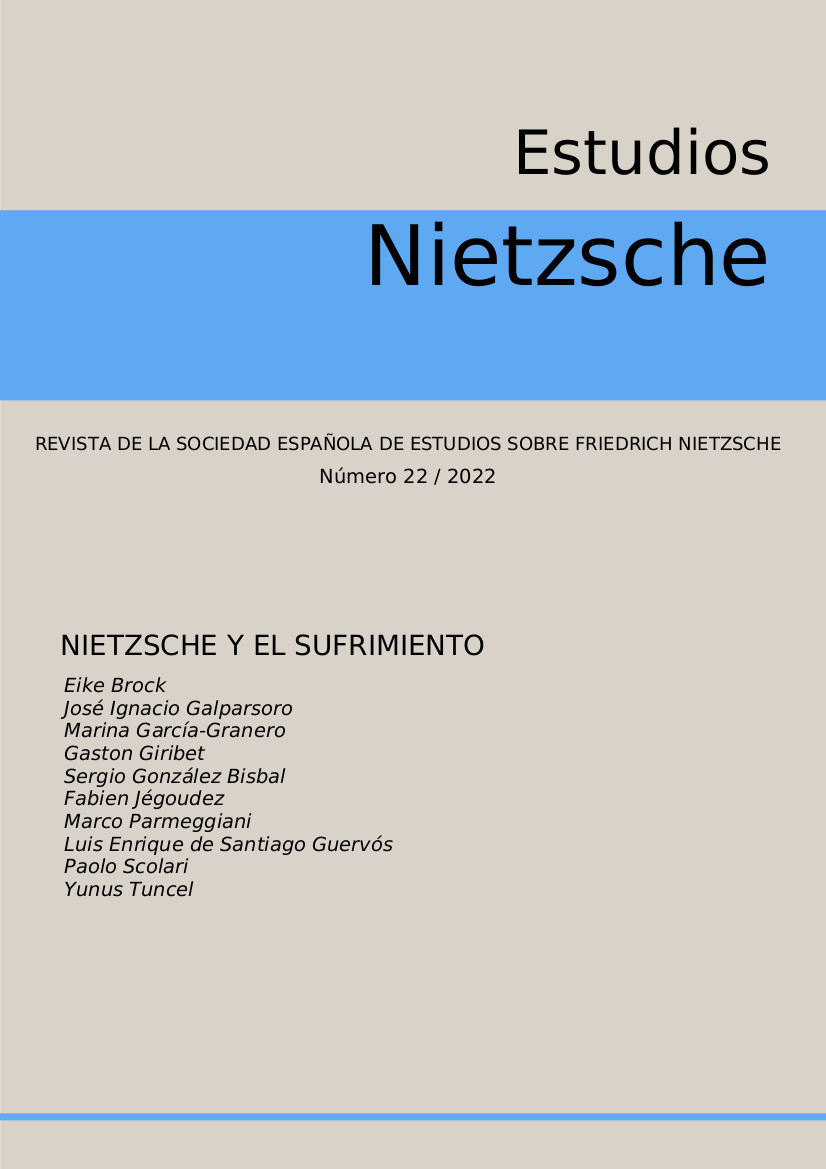Vivir con sufrimiento. Jaspers, Kierkegaard y Nietzsche como artistas del sufrimiento
DOI:
https://doi.org/10.24310/EstudiosNIETen.vi22.15404Palabras clave:
Kierkegaard, Jaspers, situación límite, agoníaResumen
Filósofos como Sören Kierkegaard, Friedrich Nietzsche o Karl Jaspers tienen un sentido especial para el sufrimiento como problema filosófico. Esto es porque ellos mismos son grandes sufridores. Jaspers y Nietzsche son enfermos crónicos, Kierkegaard sufre sobre todo de melancolía. En este contexto, no es de extrañar que el sufrimiento sea también un tema importante en sus obras. Para Jaspers, el sufrimiento es una condición básica de la existencia, una 'situación límite' (Grenzsituation) como él la llama. Por lo tanto, uno debe aceptar el sufrimiento, lo quiera o no. Más fuertemente que Jaspers, Kierkegaard y Nietzsche también hacen de su angustia personal un tema. Así, buscan una manera filosófica de vivir con su agonía. Para ambos el perspectivismo juega un papel decisivo. Siempre depende de qué lado se mira el propio sufrimiento y en qué contexto se sitúa. Así, finalmente, ambos ven en su sufrimiento una condición necesaria de su genio, que a su vez es la condición necesaria de sus respectivas misiones filosóficas: Kierkegaard se ve a sí mismo como un correctivo de un zeitgeist conformista; Nietzsche se considera a sí mismo agente de una necesaria reevaluación de los valores. De Kierkegaard y Nietzsche aprendemos: los seres humanos son siempre artistas potenciales de transfiguración existencial, ya que son capaces de cambiar sus perspectivas.
Descargas
Métricas
Citas
Anders, Günther ³2010, Die Antiquiertheit des Menschen 1. Über die Seele im Zeitalter der zweiten industriellen Revolution. München: DTV.
Benini, Arnaldo, «Die Existenzphilosophie im Spiegel des Lebens von Karl Jaspers. Leiden als Grenzsituation»: Neue Zürcher Zeitung (NZZ), 24.09.2011 (http://www.nzz.ch/krankheit_als_grenzsituation-Id.668239; accessed 10.07.2022).
Carlisle, Clare 2019, Philosopher of the Heart. The Restless Life of Søren Kierkegaard, London: Allen Lane.
Furchert, Almut 2012, Das Leiden fassen. Zur Leidensdialektik Søren Kierkegaards. Freiburg/München: Alber.
Grøn, Arne, «Time and History», in John Lippitt y George Pattison, The Oxford Handbook of Kierkegaard, Oxford: Oxford University Press, 2013, pp. 273-291.
Jaspers, Karl 1932, Philosophie II. Existenzerhellung (= P II), Berlin/Heidelberg/New York: Springer.
Jaspers, Karl 1973, Allgemeine Psychopathologie. Ein Leitfaden für Studierende, Ärzte und Psychologen, Berlin/Heidelberg/New York: Springer.
Jaspers, Karl 1984, Philosophische Autobiographie, München: Piper.
Jaspers, Karl, «Karl Jaspers. Ein Selbstporträt», in Was ist Philosophie? Ein Lesebuch. München: Piper ²1997, pp. 7-29.
Kierkegaard, Søren, Gospel of Sufferings (= Gospel), trans. By A. S. Aldworth and W. S. Ferrie, Cambridge: The Lutterworth Press, 2015.
Kierkegaard, Søren, The Sickness unto Death. A Christian Psychological Exposition for Upbuilding and Awakening (= SUD), ed. and transl. with Introduction and Notes by Howard V. Hong and Edna H. Hong, Princeton, New Jersey: Princeton University Press, 1980.
Kierkegaard, Søren, Fear and Trembling. Repetition (= R), ed. and transl. with Introduction and Notes by Howard V. Vong and Edna H. Wong, Princeton, New Jersey: Princeton University Press, 1983.
Kierkegaard, Søren, Concluding Unscientific Postscript to the Philosophical Crumbs (= CUP, ed. and trans. by Alastair Hannay, Cambridge et al: Cambridge University Press, 2009.
Kierkegaard, Søren, The Point of View (= PV), ed. and transl. with Introduction and Notes by Howard V. Vong and Edna H. Wong, Princeton, New Jersey: Princeton University Press, 1998.
Kierkegaard, Søren, Papirer (= Pap.), 20 Bde. ed. by Andreas Heiberg, Victor Kuhr and Einer Torsting, Copenhagen: Gyldendaal, 1909-1948. 2. Edition, ed. by Niels Thulstrup. Copenhagen: Gyldendaal,1968-1978.
Kierkegaard, Søren, Journals and Notes (= JN). Volume 9: Journals NB 26-30, ed. by Niels Jørgen Cappelørn et al, Princeton, Oxford: Princeton University Press 2017.
Nietzsche, Friedrich, Untimely Meditations, ed. by Daniel Breazeale, transl. by Richard. J. Hollingdale, Cambridge et al: Cambridge University Press, 1997.
Nietzsche, Friedrich, Human, All Too Human: A Book for free Spirits, transl. by Richard J. Hollingdale, introd. by Richard Schacht, Cambridge et al: Cambridge University Press, 1986.
Nietzsche, Friedrich, The Gay Science, ed. by Bernard Williams, transl. by Josefine Nauckhoff, Poems transl. by Adrian Del Caro, Cambridge et al: Cambridge University Press, 2001.
Nietzsche, Friedrich, Thus Spoke Zarathustra. A Book for All and None, ed. by Adrian Del Caro and Robert B. Pippin, transl. by Adrian Del Caro, Cambridge et al: Cambridge University Press, 2006.
Nietzsche, Friedrich, On the Genealogy of Morality, ed. by Keith Ansell-Pearson, transl. by Carol Diethe, Cambridge et al: Cambridge University Press, 2006.
Nietzsche, Friedrich, Ecce Homo. How one becomes what one is, transl., with an Introduction and Notes by Richard J. Hollingdale, New York et al: Penguin Books, 1979.
Descargas
Publicado
Cómo citar
Número
Sección
Licencia
A partir del número 21 (2021) esta revista se publica únicamente en acceso abierto (ruta diamante).
Desde ese número 21, como los números anteriores publicados en ESTUDIOS NIETZSCHE, están sujetos a la licencia Creative Commons Reconocimento-NoComercia-Compartirigual 4.0 cuyo texto completo puede consultar en <http://creativecommons.org/licenses/by-nc-sa/4.0>
Es responsabilidad de los autores/as obtener los permisos necesarios de las imágenes que están sujetas a derechos de autor.
Esta obra está bajo licencia internacional Creative Commons Reconocimiento-NoComercial-CompartirIgual 4.0.
Los derechos de autoría son de dos tipos: morales y patrimoniales, los cuales Estudios de Nietzsche reconoce y respeta. Los derechos morales son los relacionados con el reconocimiento de autoría. Son prerrogativas perpetuas, irrenunciables, intransferibles, inalienables, inembargables e imprescriptibles como consecuencia del vínculo indivisible del autor/a y su obra.
Los derechos patrimoniales son aquellos que se derivan de la reproducción, distribución, adaptación o comunicación pública de la obra, entre otros. Estos derechos patrimoniales son cedidos por Estudiso de Nietzsche a la Universidad de Málaga en acceso abierto.
Los autores/as cuyas contribuciones sean aceptadas para su publicación en esta revista conservarán el derecho no exclusivo de utilizar sus
contribuciones con fines académicos, de investigación y educativos,
incluyendo el auto-archivo o depósito en repositorios de acceso abierto de cualquier tipo.
La edición electrónica de esta revista esta editada por la Editorial de la
Universidad de Málaga (UmaEditorial), siendo necesario citar la procedencia en cualquier reproducción parcial o total.







11.png)
